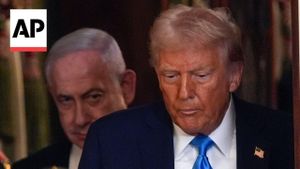The United States Postal Service (USPS) has temporarily halted the acceptance of parcels from China and Hong Kong, citing unspecified reasons for this significant operational adjustment.<\/p>\n
This suspension is effective immediately and applies solely to parcels, leaving letters and flat mail unaffected.
\nThe announcement was made just as the Trump administration imposed new tariffs on imported goods, increasing the complexity of international shipping, especially for e-commerce players such as Shein and Temu, which rely heavily on the de minimis exemption for low-value shipments.
\nAccording to the USPS statement released on Tuesday, this action is aimed at addressing the influx of packages entering the United States from these regions without the typical tariffs, resulting from the de minimis regulation which allowed goods valued under $800 to clear customs without additional duties.
\nOn the same day as the USPS announcement, Chinese authorities retaliated against the U.S. tariffs by levying their own charges on U.S. exports, aiming to impose 15% tariffs on coal and liquefied natural gas and 10% tariffs on agricultural machinery and crude oil imports from the United States.
\nThis series of trade measures has raised eyebrows among industry experts who note the potential for operational disruptions across e-commerce platforms.
\n“This change is going to impact how these retailers operate,” said Louise Loo, the lead economist for Greater China at Oxford Economics. She noted the significant rise of de minimis shipments over the years, with U.S. Customs and Border Protection reporting over 1.36 billion such shipments entering the country during the 2024 fiscal year alone. This dramatic increase has raised concerns about the enforcement of trade laws, consumer protection, and the importation of potentially harmful goods, including the opioids linked to the fentanyl crisis.
\nNotably, companies like Shein and Temu account for over 30% of the daily parcel volumes entering the U.S., largely benefitting from the de minimis rule.
\n“The USPS's decision poses greater challenges for these e-commerce platforms,” remarked Niall van de Wouw, Chief Airfreight Officer at freight platform Xeneta, who pointed out the lack of significant oversight due to the volume of packages unexpectedly flooding the market.
\nWhen President Trump signed his executive order to remove the de minimis loophole, it marked the first significant overhaul of these import regulations, which were primarily aimed at facilitating personal gifts and small items but became exploited by businesses to ship goods directly to U.S. consumers without tariffs.
\nThe fallout from these changes could lead to price increases for consumers, who may be burdened by the additional fees associated with previously duty-free items. Experts warn this shift could upset the entire online shopping ecosystem.
\nCindy Allen, CEO of Trade Force Multiplier, highlighted the practical impacts: “A woman’s dress made of synthetic fiber, which originally cost about $5, may now incur outgoing customs duties and several additional fees on top of the newly imposed 10% tariff,” potentially pushing the price significantly higher.
\nWith the USPS’s new guidelines, the volume of processed parcels could slow, resulting in delays and logistical complications for delivery services. Some sources indicate difficulties may arise, especially with the expected backlogs at customs.
\nThe International Mailers Advisory Group's executive director, Kate Muth, expressed concerns about the longer wait times consumers might face as the Postal Service navigates these new procedures. “Consumers should prepare for potential delays,” she advised, underscoring the uncertainty of package arrival times amid the regulatory changes.
\nWhile this suspension affects shipping from China and Hong Kong, the USPS has assured consumers it will not impact the flow of letters and other associated mail formats, directing all shipping inquiries to their official website for updates. Yet, there remains ambiguity as to how long these restrictions will last with little clarification from the administration.
\nTrade representatives and officials have yet to determine the long-term ramifications of this shift on U.S. purchasing habits. The USPS's abrupt changes come as part of broader trade negotiations and tariffs focused on reducing the U.S. trade deficit with China and regulating transnational commerce more stringently.
\nWhile both Democrats and Republicans have articulated concerns about how these new policies may influence U.S. consumers, the urgency lies within how quickly these policies can be navigated to establish clarity moving forward, especially as U.S. officials gear up for discussions with their Chinese counterparts to address these mounting tensions.



